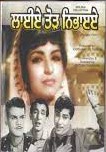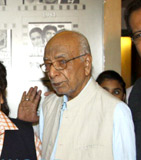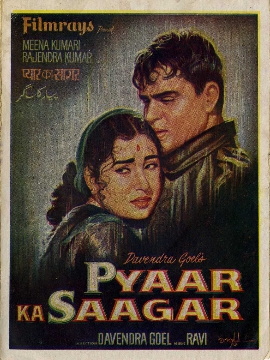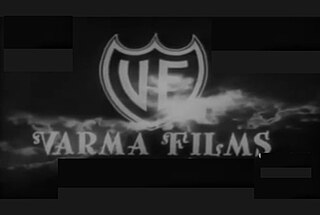| Laiye Tod Nibhaiye | |
|---|---|
 | |
| Directed by | Satish Chabbra |
| Screenplay by | Balkrishna Mauj |
| Story by | Balkrishna Mauj |
| Produced by | Krishan Lal Varma |
| Starring | Nishi Ravindra Kapoor |
| Cinematography | Mohan Keshwani |
| Edited by | Hari Pathare |
| Music by | S Madan |
Production company | Varma International Pictures |
| Distributed by | Varma International Pictures |
Release date |
|
Running time | 136 minutes |
| Country | India |
| Language | Punjabi |
''Laiye Tod Nibhiye'' (English translation: "Let's forever be together") is a 1966 Punjabi-language film directed by Satish Chabbra and starring Nishi and Ravindra Kapoor in the lead roles with Gopal Sehgal, Sheela R and Ravi Khanna in supporting roles. [1] The film was distributed and produced by Varma International Pictures. It was produced by Krishan Lal Varma, son of Biharilal Varma, one of the founders of Varma Films. Previously Nishi, who played the lead female role in Laiye Tod Nibhiye had worked in supporting roles in three films produced by Varma Films and its affiliates: Baghi Sipahi (1958), [2] Night Club (1958) [3] and Main Nashe Mein Hoon (1959). [4] Laiye Tod Nibhiye marked the first time Nishi had been cast in a lead role in a film associated with the Varma family.
Contents
The prominence of Laiye Tod Nibhiye arises from the ensemble compiled by the filmmakers for the film. First, Nishi, the lead actress, as well as Ravindra Kapoor, the lead actor of Laiye Tod Nibhiye, were at the prime of their careers in the Punjabi cinema, as evidenced by how prolific each of them was during the 1960s, the decade in which Laiye Tod Nibhiye was released. The List of Punjabi films of the 1960s shows that each of these stars were featured in lead roles in at least 10 Punjabi films during the 1960s. Not surprisingly, Nishi was branded as a "big name in Punjabi cinema" [5] and called the "mother of Punjabi cinema." [6]
Second, considering the widely held belief regarding the impact of Indian film songs on a movie's commercial success, [7] the significance of Laiye Tod Nibhiye emerges from the collaboration between its music composer, the lyricists and the playback singers used for its songs. Following the triumph of the Punjabi-language movies Lado Rani (1963) and Mama Ji (1964), S. Madan, the music composer of Laiye Tod Nibhiye gained widespread fame all across the Punjab region and was recognized as a major composer in the Punjabi film industry. [8] Both of the lyricists, Verma Malik and Naqsh Lyallpuri were renowned in the Punjabi cinema. Finally, the playback singers for the film included: Mohammed Rafi, voted the Greatest Voice in Hindi Cinema in a CNN-IBN's poll, [9] the legendary Shamshad Begum [10] and Asha Bhonsle, believed to be on the list of singers to have sung the highest number of film songs. [11]
Overall, Laiye Tod Nibhiye, released during the Golden Age of Hindi Cinema which unfolded from the late 1940s to the 1960s, exemplifies how filmmakers in that era strategically collaborated with renowned stars, music composers, lyricists and playback singers to achieve the commercial success of a film. [12] [13]




